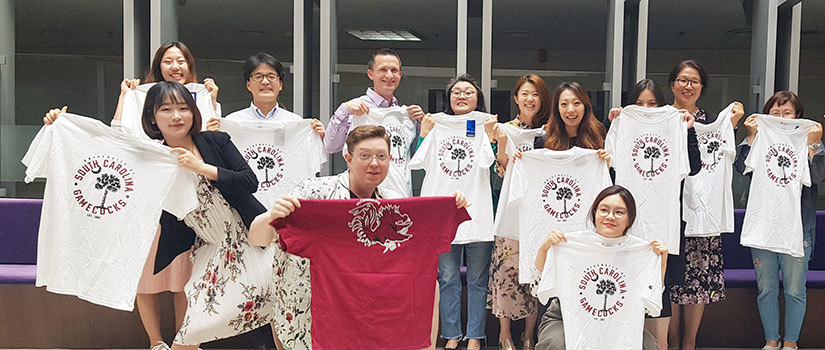July 30, 2019
Chris Woodley • cwoodley@mailbox.sc.edu
College of Social Work classes are not only held in Columbia, Charleston and Greenville. Since 1993, the college has offered part-time classes in Asia as part of the Korea-Based Master of Social Work program. Several faculty and staff have traveled and taught classes abroad, and Associate Professor Robert Hock recently returned from his first teaching experience in Korea.
“It was an incredible opportunity to work and live in South Korea with my family. I was excited to meet the students but also nervous about teaching in another language,” Hock said. “I wanted to do this for years and felt that my children were finally old enough, and I had enough flexibility in my summer schedule this year. This was my first time in Korea, and I wasn’t sure what to expect. But the Korea program staff and students were so warm and welcoming that I felt comfortable right from the start.”
Hock taught two classes for the program’s ninth cohort during his time in Seoul, Korea from May 20 to July 2. While the Korea-Based MSW program follows the same part-time curriculum offered in South Carolina, classes are accelerated to three weeks for each class. Since most of the students work full-time, the classes are held Thursday and Friday evenings and all-day Saturday. The classes are held in the Seoul Women's Plaza, a city-owned building which houses organizations serving and supporting children, women, and family policies.
“Most of the students are professionals, pursuing social work as a second career. As a result, they brought rich and varied professional experience to our classroom discussions.”
- Associate Professor Robert Hock
“They take one class at a time, so I taught three weeks of family therapy, followed by three weeks of advanced mental health interventions with the same students,” Hock said. “The students were impressive because most of them work full-time. For example, there was a music therapist and an art therapist who both saw clients and worked with children and families during the day and took classes at night. Another student was a school social worker.”
“The classes were no more than 12 students, and I loved it because there were more opportunities to interact,” Hock said. “This group also gave constructive, meaningful feedback which contributed to each other's learning. We often had lunch together during Saturday classes, which also helped with the faculty-student relationship. They are very committed to the in-class experience.”
But one of the biggest initial adjustments for Hock was the language barrier, as classes are taught through a live translator. This was particularly evident during classroom role-play sessions.
“Students had to demonstrate structural family therapy approaches through a translator, which made it interesting,” Hock said. “Not only were my instructions translated, but what the students said to each other was translated for me. It took patience on everyone's part. Kyunghee Ma (Director of the Korea-Based MSW Program) did the translations live in the classroom, which was impressive to see. Sometimes the meaning of the words was ambiguous, and we had to correct or work through it, but the students were an active part of that process. The cross-cultural comparison of mental health and family intervention concepts enriched everyone’s learning.”
Hock also said he was surprised by how powerless and dependent he felt in a classroom where he spoke a different language. But he was grateful for the students’ patience and hospitality.
“All these people were looking at me, and I couldn't speak their language or talk directly to them. I was completely dependent on another person's interpretation of what I was saying,” Hock said. “I didn’t know if they would understand my concepts or jokes and how it was explained. It took an incredible amount of trust between Dr. Ma and I to make it work. The students respected me as a professor, but they also felt a level of care for me as a visitor in their country. They really wanted me to have a good experience.”
The Korea-Based MSW program was developed in response to a request from Korean social workers who desired a master's degree, but whose life circumstances prevented them from studying in the United States. The program is completed in two-and-a-half years and has graduated 175 students. The ninth cohort will be in Columbia this December to receive their degrees at the winter commencement.
While Hock is back in Columbia and preparing for his fall semester classes, he wants to return to Korea to not only teach but also take advantage of opportunities for research and collaboration beyond the classroom.
“I really felt invigorated in my teaching,” Hock said. “It was intellectually stimulating to be forced to rethink all of the ways I communicate and approach the classroom experience and assignments. I adapted to the environment to create the same kind of learning experience for Korean students that I would give Columbia students. It was very satisfying for me as a teacher.”
